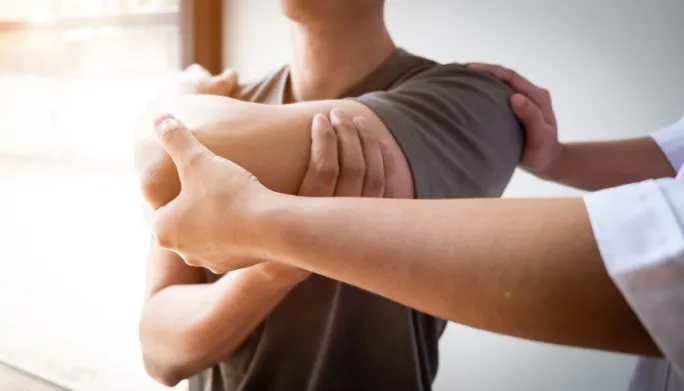Rotator Cuff Tears in Westchase
What is a Rotator Cuff Tear?
A rotator cuff tear is a common shoulder injury that affects the muscles and tendons around the shoulder joint. These muscles and tendons form the rotator cuff, which helps you move your arm and shoulder. When one or more of these tendons become torn, it can cause pain and limit your ability to use your shoulder properly.

Who Might Experience a Rotator Cuff Tear?
Rotator cuff tears can happen to anyone, but they are more common in:
- People Over 40
As we age, the tendons in our rotator cuff can become weaker and more prone to tearing.
- Athletes and Active Individuals
Sports that involve repetitive overhead motions, like baseball or tennis, can increase the risk of rotator cuff injuries.
- Manual Laborers
Jobs that require heavy lifting or repetitive arm movements can also raise the risk of a tear.
How Do You Know If You Have a Rotator Cuff Tear?
Here are some common signs and symptoms that may indicate a rotator cuff tear:
Shoulder Pain: Pain in the shoulder that can be sharp or dull, especially when lifting or reaching.
Weakness: Difficulty lifting or moving the arm, especially when lifting objects overhead.
Limited Range of Motion: Reduced ability to move the arm and shoulder in certain directions.
Popping or Clicking: Some people may hear or feel popping or clicking sensations in the shoulder.
What Causes a Rotator Cuff Tear?
Rotator cuff tears can occur for several reasons, including:
- Aging
As we get older, the tendons in the rotator cuff can weaken and become more susceptible to tears.
- Injury or Trauma
A sudden injury, like a fall or lifting something heavy, can cause a tear.
- Repetitive Movements
Engaging in activities or sports that involve repetitive arm movements can lead to wear and tear on the tendons over time.
Types of Rotator Cuff Tears
There are two main types of rotator cuff tears:
- Partial Tear
In a partial tear, the tendon is damaged but not completely severed. It may still function to some extent.
- Full Tear
In a full tear, the tendon is completely severed from the bone, which can significantly impact shoulder function.
How Can Rotator Cuff Tears Be Treated?
The treatment for a rotator cuff tear depends on the severity of the tear and the patient’s individual needs. Here are some common approaches:
- Rest and Physical Therapy
For minor tears, rest, and physical therapy exercises can help strengthen the shoulder muscles and improve range of motion.
- Medications
Pain relievers and anti-inflammatory medications can help manage pain and reduce inflammation.
- Corticosteroid Injections
In some cases, a doctor may recommend corticosteroid injections to reduce pain and inflammation.
- Surgery
For severe tears or when other treatments haven’t worked, surgery may be necessary to repair the torn tendon.
What to Expect During Recovery
Recovery from a rotator cuff tear can take time, and it’s essential to follow your healthcare provider’s recommendations. Here’s what you can expect:
Rest: You may need to rest your shoulder and limit certain activities while the tendon heals.
Physical Therapy: Physical therapists will help you regain strength and range of motion through specific exercises.
Medications: Pain medications may be prescribed to manage discomfort during recovery.
Surgery Recovery: If you undergo surgery, you’ll need to follow post-operative instructions carefully and attend follow-up appointments.
Can Rotator Cuff Tears be Prevented?
While some rotator cuff tears are unavoidable, you can take steps to reduce your risk:
Strength Training: Engage in exercises that strengthen the shoulder muscles to provide better support to the rotator cuff.
Proper Technique: When playing sports or lifting heavy objects, use proper techniques to avoid overexerting the shoulder.
Avoid Overuse: Take breaks during repetitive activities to prevent excessive strain on the tendons.
Looking for Rotator Cuff Treatment?
In conclusion, a rotator cuff tear is a common shoulder injury that can cause pain and limit your ability to use your shoulder. However, with proper diagnosis and treatment, many people can recover and regain full use of their shoulders.
If you suspect you have a rotator cuff tear or are experiencing shoulder pain and limited mobility, consult a healthcare professional for a proper evaluation and personalized treatment plan. By following your healthcare provider’s recommendations and taking preventive measures, you can help protect your shoulder and maintain an active lifestyle!

